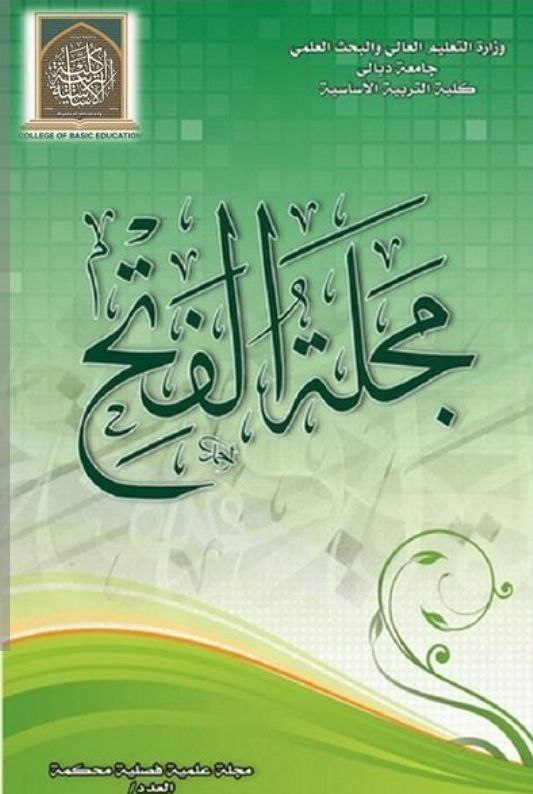Self-love and its relationship to organizational loyalty among kindergarten teachers
DOI:
https://doi.org/10.23813/FA/24/2/12Keywords:
self-love, organizational loyalty, kindergartenAbstract
The current research aims to identify self-love and its relationship to organizational loyalty among kindergarten teachers according to the variable years of service (1-10 years, 11 years-more), and the current research sample consisted of (200) kindergarten teachers inside Baghdad, and after building a love scale Self-esteem and the adoption of the organizational loyalty scale and their application to the sample. The data were analyzed using appropriate statistical methods to treat them. The research results showed that kindergarten teachers enjoy self-love and in favor of those who have experience (1-10 years), and that teachers who have experience (11 years - or more) ) enjoy organizational loyalty towards their organization, and the researcher reached a number of recommendations and proposals.
References
ابراهيم ، انتصار (2000): تصور مقترح لتطوير برامج إعداد معلمات رياض الأطفال في مصر ، مجلة عالم التربية ، عدد 2 ، السنة الأولى.
جلال ، احمد سعد (2008): مبادئ القياس النفسي ، تطبيقات وتدريبات عملية على برنامج SPSS ، الدار الدولية للنشر، مصر.
الحمداني ، مريم بنت سالم (2009): الولاء التنظيمي لاعضاء الهيئة التدريسية في الجامعات الخاصة بسلطنة عمان ، رسالة ماجستير ، جامعة مؤتة.
خوجة ، عادل (2009): أثر البرنامج الرياضي المقترح في تحسين صورة الجسم ومفهوم تقدير الذات لدى فئة ذوي الاحتياجات الخاصة ، جامعة المسيلة ، الجزائر.
رسمي ، محمد حسن (2004): السلوك التنظيمي في الإدارة التربوية ، دار الوفاء للنشر ، الاسكندرية.
زريق ، نجاة سالم عبد الله (2011): الولاء التنظيمي لدى اعضاء الهيئة التدريسية ، مجلة الجامعة الأسمرية ، العدد 21.
سلطان ، محمد (2003): السلوك التنظيمي ، دار الجامعة الجديدة ، مصر.
عبد الرؤوف ، طارق ( 2008 ): معلمة رياض الأطفال ، مؤسسة طيبة للطباعة والنشر والتوزيع ، مصر.
العتيبي ، سعود ، والسواط ، طلق (1997): الولاء التنظيمي لمنتسبي جامعة الملك عبد العزيز والعوامل المؤثرة فيه ، الإداري ، معهد الإدارة العامة ، عمان ، العدد 70.
فرج ، صفوت (1980): القياس النفسي ، ط1 ، دار الفكر العربي ، مصر.
فروم ، اريك (2007): الانسان من أجل ذاته بحث في سيكولوجية الاخلاق ، ط1 ، ترجمة محمود منقذ الهاشمي.
فلية ، فاروق ، عبدالمجيد ، محمد (2005): السلوك التنظيمي في إدارة المؤسسات التعليمية ، دار المسيرة ، الاردن.
القاسم ، بديع محمود مبارك (2001): علم النفس المهني بين النظرية والتطبيق ، ط1 ، مؤسسة الوراق للنشر ، الاردن.
الكايد، جعفر احمد محمد (1999): الولاء التنظيمي في الجامعات الرسمية الأردنية،
a. رسالة ماجستير غير منشورة، كلية الاقتصاد والعلوم الإدارية، قسم الإدارة العامة، جامعة اليرموك، الأردن.
لوتاه ، حمده محمد (2002): الولاء التنظيمي وأداء العاملين في القطاع الحكومي في دولة الامارات العربية المتحدة ، رسالة ماجستير غير منشورة، كلية الاقتصاد والعلوم السياسية ، جامعة القاهرة ، مصر.
المعاني ، أيمن (1999): الولاء التنظيمي لدى المديرين في الوزارات الأردنية ، مجلة الإداري ، ع 78 ، مسقط.
English sources
Аndro, P. (2006).Organizational Commitment of senior woman Administrators, The degree of doctor of Education, The Florida State University, College of Education.
Anastasia, A. (1976): Psychological testing. Fourth, New York, Macmillan Company.
Campbell, W. Finkel, E. & Foster, C. (2002): Does self-love lead to love for others? A story of narcissistic game playing, Journal of Personality and Social Psychology, 83 (2).
Coberly, B. M.( 2004): Faculty satisfaction and OrganizationalCommitment with industry, University research centers, north Carolina state University.
Covey, S. (2004): The 8th Habit, London. Simon & Schuster.
Ferris, R. (1988): How Organizational Love can improve Leadership, Organizational Dynamics, 16 (4).
Kay, L.D. (2003): Self – Esteem Levels of Adolescents with Learning Disabilities or Mental Retardation in Inclusive or Non- Inclusive Educational Settings. Master's thesis, The Graduate School, Rowan University.
Le, T. & Levenson, and M. (2005): Wisdom as self-transcendence: What’s love & individualism, got to do with it? Journal of Research in Personality, 39 (4).
Macey, W. & Schneider, B. (2008): The Meaning of Employee Engagement, Industrial and Organizational Psychology, (1).
Maharaja, N. & April, K. (2013): The power of self-love in the evolution of leadership and employee engagement, Problems and Perspectives in Management, Volume 11, Issue 4.
Meyer .J & Allen. N .A (1991): "Three – Component Conceptualization of Organizational Commitment", Human Resource Management Review, No.1.
Sedikides C. & Gregg, A. (2003): Portraits of the Self. In M. A. Hogg & J. Cooper (Eds.), Sage handbook of social psychology, London: Sage.
Schroder R. (2003): Job satisfaction and the relationship to Organizational commitment and religious commitment forAndrews University employees (Michigan), Andrews University.
Steers, R. M.(1977):Antecedents and Outcomes of OrganizationalCommitment Administrative Science Quarterly, Vol. 22, No. 1.
Trobisch, W. (1976): Love Yourself: Self-Acceptance and Depression, Rheine: Editions Trobisch.
Downloads
Published
How to Cite
Issue
Section
License
Copyright (c) 2020 http://creativecommons.org/licenses/by/4.0

This work is licensed under a Creative Commons Attribution 4.0 International License.
حقوق النشر والترخيص
تطبق مجلة الفتح للبحوث التربوية والنفسية ترخيص CC BY (ترخيص Creative Commons Attribution 4.0 International). يسمح هذا الترخيص للمؤلفين بالاحتفاظ بملكية حقوق الطبع والنشر لأوراقهم. لكن هذا الترخيص يسمح لأي مستخدم بتنزيل المقالة وطباعتها واستخراجها وإعادة استخدامها وأرشفتها وتوزيعها ، طالما تم منح الائتمان المناسب للمؤلفين ومصدر العمل. يضمن الترخيص أن المقالة ستكون متاحة على نطاق واسع بقدر الإمكان وأن المقالة يمكن تضمينها في أي أرشيف علمي.
لمزيد من المعلومات، يرجى متابعة الرابط: https://creativecommons.org/licenses/by/4.0/.



